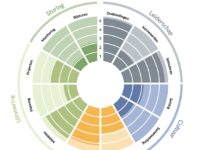The Network of Public Services (NPD) was established to collectively support and inspire public services, share knowledge and expertise and to lobby policy and politics. The NPD is an informal network of over 80 public services. Together, we present a strong voice towards politics and policy to make our wishes feasible, aiming for improving public services for citizens and entrepreneurs.
Case Study Library
Where innovations are collected and shared to disseminate and replicate good ideas

Innovations:
0
This website, as well as any data and map included herein, are without prejudice to the status of or sovereignty over any territory, to the delimitation of international frontiers and boundaries and to the name of any territory, city or area.
Rainlevelr is a joint approach to reduce the risk of flooding. By utilizing the water basins of horticultural companies, the Delfland horticultural area can absorb heavier downpours, thus preventing flooding for both the businesses and the surrounding area. In Rainlevelr, regional authorities, ‘Glastuinbouw Nederland’ and horticultural companies collaborate closely. The uniqueness of this innovation lies in the collaboration among various stakeholders involved in the use of water buffers…
Case Study
Most sustainable CLA of the Netherlands; Collective Employment Agreement as a instrument to boost…

Dutch Central Government (employer) and Trade Unions reserved €6 million to experiment with and include a wide range of (new) Green Benefits in the Collective Labour Agreement (CLA) to fight climate change. Through a unique, multi-party innovation process, over 75 civil servants and multilevel teams were trained in innovation and experimentation and jointly came together to develop green benefits pilots to be included in the CLA. The ultimate goal is to develop methods to involve all levels of…
Together with partners from 5 other European countries, the Province of Fryslân developed an innovation model (so-called Tipping Approach) to catalyse and stimulate bottom-up innovations and harness ideas from local stakeholders. Complementing this, a governance model is being developed to provide civil servants with tools to implement these innovations in the social process in a simple and user-friendly way.
A lot of innovative activities are carried out by Dutch and other governments. Unfortunately, the impact is limited. Innovations are stand alone projects, not implemented or scalable within primary processes. This reference model supports the implementation of an innovation management system for governments. The starting point is an Innovation Maturity Scan. Tooling, training and handouts are available supporting a social and process innovation transition at governmental organizations.
Case Study
Cross-KIC Circular Economy in the Western Balkans: Systems and stakeholders mapping for policy…
Better ecosystem understanding is needed in the Western Balkans where governments face the challenge of aligning with the European Green Deal and Circular Economy amid EU enlargement discussions. This project implements an innovation policy for sustainable growth by introducing tools for territorial analysis to support development policies. It is the first regional effort of this kind, positioning existing circular economy challenge owners in a system viewpoint as part of a co-creation process.
Cities are confronted with complex problems which require collaboration across different levels and sectors of society. City Deals are issue-based partnerships for urban sustainable innovation between frontrunners in the public and private sector. Ministries, local and regional governments, and businesses working together to experiment and develop solutions for issues such as circular buildings, smart cities and shared electric mobility.
The iSPEX is a small attachment that can be fitted to any mobile phone to measure particulate matter in the air. The fact that this piece of technology empowers anyone to monitor air quality (citizen science) creates a raft of new possibilities to collect large volumes of data in a highly efficient and cost-effective manner. Aside from that, it raises awareness of particulate matter among the population.
Organisational development in a municipality within a framework set by the municipal council is not new. However, a local authority can still be innovative in how it designs such development and the role employees play in it. In Nijkerk (approx. 43,000 inhabitants), this has led to an organisation made up of 28 self-managing teams that come directly under the authority of the municipal clerk. Nijkerk went through a process where employees and the development of their talent came first.
The 3D map of the Netherlands has been available from the Dutch Land Registry Office since 2014 on an open data basis. This map is intended as a basic file that institutions from across the public and private sector can use for their purposes, such as to link data to and run analyses. It can, for example, be used to assess and calculate how wind turbines affect the local environment in terms of noise, flows of air, and the shadows they cast, but also to assess their visual impact in the…


